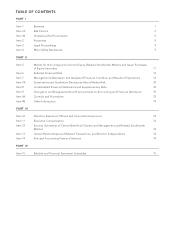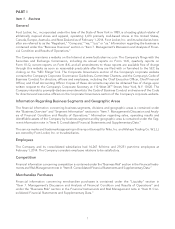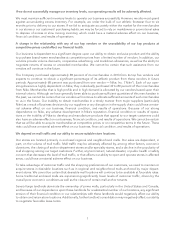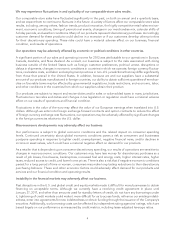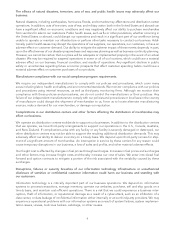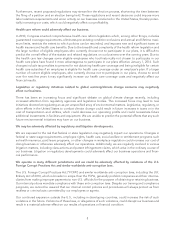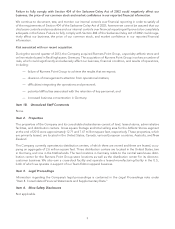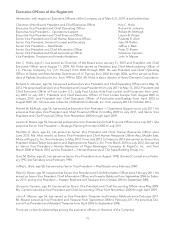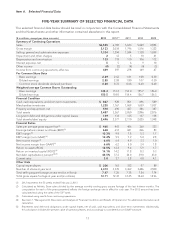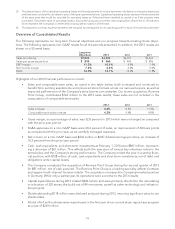Foot Locker 2013 Annual Report Download - page 31
Download and view the complete annual report
Please find page 31 of the 2013 Foot Locker annual report below. You can navigate through the pages in the report by either clicking on the pages listed below, or by using the keyword search tool below to find specific information within the annual report.Furthermore, recent proposed regulations may streamline the election process, shortening the time between
the filing of a petition and an election being held. These regulations and recent decisions could impose more
labor relations requirements and union activity on our business conducted in the United States, thereby poten-
tially increasing our costs, which could negatively affect our profitability.
Health care reform could adversely affect our business.
In 2010, Congress enacted comprehensive health care reform legislation which, among other things, includes
guaranteed coverage requirements, eliminates pre-existing condition exclusions and annual and lifetime maxi-
mum limits, restricts the extent to which policies can be rescinded, and imposes new and significant taxes on
health insurers and health care benefits. Due to the breadth and complexity of the health reform legislation and
the large number of eligible employees who currently choose not to participate in our plans, it is difficult to
predict the overall effect of the statute and related regulations on our business over the coming years. Due to
the health care law changes some eligible employees who had historically not chosen to participate in our
health care plans have found it more advantageous to participate in our plans effective January 1, 2014. Such
changes include tax penalties to persons for not obtaining healthcare coverage and being ineligible for certain
health care subsidies if an employee is eligible for health care coverage under an employer’s plan. If a larger
number of current eligible employees, who currently choose not to participate in our plans, choose to enroll
over the next few years it may significantly increase our health care coverage costs and negatively affect our
financial results.
Legislative or regulatory initiatives related to global warming/climate change concerns may negatively
affect our business.
There has been an increasing focus and significant debate on global climate change recently, including
increased attention from regulatory agencies and legislative bodies. This increased focus may lead to new
initiatives directed at regulating an as-yet unspecified array of environmental matters. Legislative, regulatory, or
other efforts in the United States to combat climate change could result in future increases in taxes or in the
cost of transportation and utilities, which could decrease our operating profits and could necessitate future
additional investments in facilities and equipment. We are unable to predict the potential effects that any such
future environmental initiatives may have on our business.
We may be adversely affected by regulatory and litigation developments.
We are exposed to the risk that federal or state legislation may negatively impact our operations. Changes in
federal or state wage requirements, employee rights, health care, social welfare or entitlement programs such
as health insurance, paid leave programs, or other changes in workplace regulation could increase our cost of
doing business or otherwise adversely affect our operations. Additionally, we are regularly involved in various
litigation matters, including class actions and patent infringement claims, which arise in the ordinary course of
our business. Litigation or regulatory developments could adversely affect our business operations and finan-
cial performance.
We operate in many different jurisdictions and we could be adversely affected by violations of the U.S.
Foreign Corrupt Practices Act and similar worldwide anti-corruption laws.
The U.S. Foreign Corrupt Practices Act (‘‘FCPA’’) and similar worldwide anti-corruption laws, including the U.K.
Bribery Act of 2010, which is broader in scope than the FCPA, generally prohibit companies and their interme-
diaries from making improper payments to non-U.S. officials for the purpose of obtaining or retaining business.
Our internal policies mandate compliance with these anti-corruption laws. Despite our training and compliance
programs, we cannot be assured that our internal control policies and procedures will always protect us from
reckless or criminal acts committed by our employees or agents.
Our continued expansion outside the U.S., including in developing countries, could increase the risk of such
violations in the future. Violations of these laws, or allegations of such violations, could disrupt our business and
result in a material adverse effect on our results of operations or financial condition.
8




